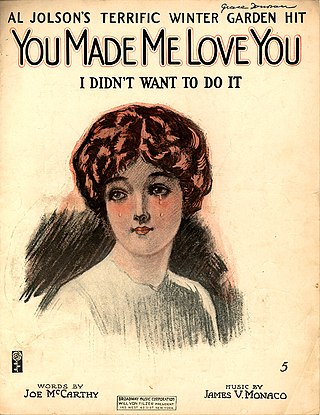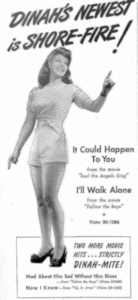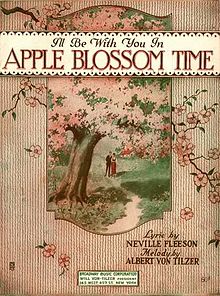"Rum and Coca-Cola" is a popular calypso song composed by Lionel Belasco with lyrics by Lord Invader. The song was copyrighted in the United States by entertainer Morey Amsterdam and was a hit in 1945 for the Andrews Sisters.
"You Always Hurt the One You Love" is a pop standard with lyrics by Allan Roberts and music by Doris Fisher. First recorded by the Mills Brothers, whose recording reached the top of the Billboard charts in 1944, it was also a hit for Sammy Kaye in 1945.
"'A' You're Adorable" is a popular song with music by Sid Lippman and lyrics by Buddy Kaye and Fred Wise, published in 1948.
"Teach Me Tonight" is a popular song that has become a jazz standard. The music was written by Gene De Paul, the lyrics by Sammy Cahn. The song was published in 1953.
"All I Do Is Dream of You" is a popular song. The music was written by Nacio Herb Brown, the lyrics by Arthur Freed. The song was published in 1934. It was originally written for the Joan Crawford film Sadie McKee (1934) when it was played during the opening credits and later sung by Gene Raymond three times. It was also sung in the film by Earl Oxford in a show. The song is also featured in the films Singin' in the Rain, A Night at the Opera, The Affairs of Dobie Gillis, and Crimes and Misdemeanors.

"Sentimental Journey" is a popular song published in 1944. The music was written by Les Brown and Ben Homer, and the lyrics were written by Bud Green.
"Green Eyes" is a popular song, originally written in Spanish under the title "Aquellos Ojos Verdes" by Adolfo Utrera and Nilo Menéndez in 1929. The English translation was made by Eddie Rivera and Eddie Woods in 1931.
"Skylark" is an American popular song with lyrics by Johnny Mercer (1909-1976), and music by Hoagy Carmichael (1899-1981), published in 1941.

"You Made Me Love You (I Didn't Want to Do It)" is a popular song from 1913 composed by James V. Monaco with lyrics by Joseph McCarthy. It was introduced by Al Jolson in the Broadway revue The Honeymoon Express (1913), and used in the 1973 revival of the musical Irene.

"I'll Get By (As Long as I Have You)" is a popular song with music by Fred E. Ahlert and lyrics by Roy Turk that was published in 1928. Versions by Nick Lucas, Aileen Stanley and, most successfully, Ruth Etting, all charted in America in 1929.
"Don't Take Your Love from Me" is a popular song written by Henry Nemo and published in 1941. Mildred Bailey first recorded this song in 1940 before publication. It was introduced that year by singer Joan Brooks.
"My Foolish Heart" is a popular song and jazz standard that was published in 1949. In the UK, the song reached No. 1 in the chart based on sales of sheet music, staying at the top spot for 11 weeks in 1950.

"I'll Walk Alone" is a 1944 popular song with music by Jule Styne and lyrics by Sammy Cahn. The song was written for the 1944 musical film Follow the Boys, in which it was sung by Dinah Shore, and was nominated for the Academy Award for Best Original Song but lost to “Swinging on a Star”. Shore recorded the song in March as a single, which became her first #1 hit on the Billboard charts.

"Near You" is a popular song written and originally recorded by Francis Craig and His Orchestra at Castle Studio in 1947, with lyrics by Kermit Goell, which became a pop standard.
"There! I've Said It Again" is a popular song written and published by Redd Evans and David Mann in 1941. In early 1945, Vaughn Monroe and his Orchestra released Victor 20-1637, which reached the number one position on the Billboard's National Radio Airplay chart for five straight weeks, then no.2 for six more weeks, and a total run of 29 weeks. It finished 1945 as the no. 4 record of the year.

"Things" is a song which was written and recorded by Bobby Darin in 1962. Released as a single, it reached No.3 in the U.S.and Canada, No.2 in the U.K., and No.3 in the first-ever official Irish Singles Chart, published by RTÉ in October 1962. It was later covered by Ronnie Dove and became a Top 30 country hit for him.
"Sioux City Sue" is a 1945 song and a 1946 movie. Lyricist Ray Freedman and composer Dick Thomas wrote the song. Thomas recorded the song in February 1945 for National Records and it was a number one Country charts hit for him. The song was Thomas' first chart entry on the Juke Box Folk Records chart and was also his most successful release: "Sioux City Sue" spent four weeks at number one on the Country charts during a stay of twenty-three weeks. The Dick Thomas version also reached Billboard's Best-selling Record charts attaining the No. 16 position.
"Ciribiribin" is a merry Piedmontese ballad, originally in three-quarter time, composed by Alberto Pestalozza in 1898 with lyrics by Carlo Tiochet. It quickly became popular and has been recorded by many artists. Decades later it enjoyed continued popularity with swing and jazz bands, played in four-four time.

Heavenly is an album by American pop singer Johnny Mathis that was released on August 10, 1959, by Columbia Records and marked his return to recording ballads with orchestral accompaniment. Along with the material that others had covered before are two new songs: the title track and "I'll Be Easy to Find".

The Village of St. Bernadette is the sixth studio album by American pop singer Andy Williams and was released in early 1960 by Cadence Records. It was described by Billboard magazine as "a lovely set of pop inspirational, hymns, and religious themes".








